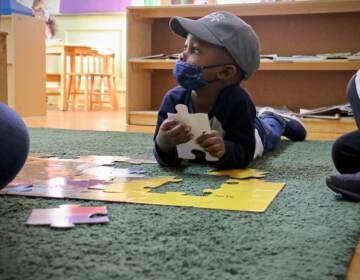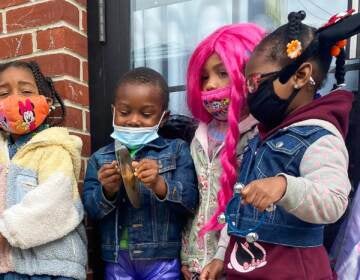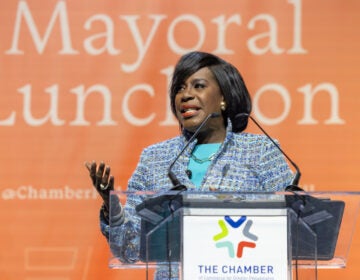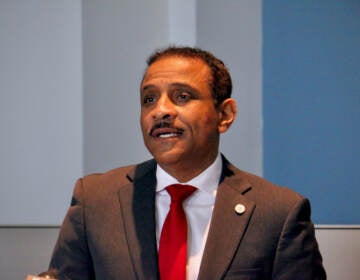Parental involvement crucial for Philly’s early learners, advocates say
With remote learning, many parents took on the role of part-time teacher to their children.
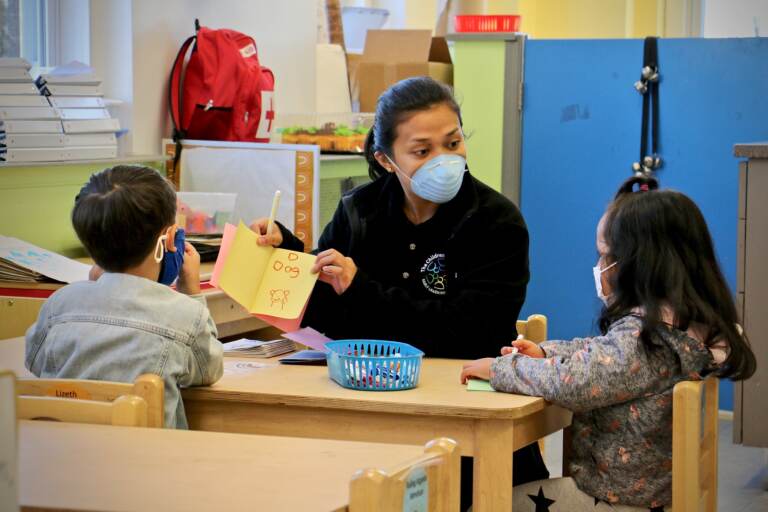
Ghealze Bernstein works with preschool students at Children's Playhouse Whitman in South Philadelphia. (Emma Lee/WHYY)
This story originally appeared on Chalkbeat Philadelphia
With remote learning, many parents took on the role of part-time teacher to their children. Now, with most students attending full-time in-person school — some for the first time — some child advocates in Philadelphia say that parental support is more important than ever.
“Though it was significant before, I really think it’s significant now because it stems to us not knowing where our students really are,” said Tomea A. Sippio-Smith, K-12 education policy director at Children First, formerly PCCY.
“Before, we understood. We want our students to be able to do X, Y and Z. The guidelines haven’t changed but everybody is aware we are experiencing life in a pandemic. Where we would love students to be is not necessarily where students are because they have not had that foundation we were so used to offering in the past. It’s even more important now because we don’t know the long-term impact that’s going to have on our students.”
Before the pandemic started, Tina Barlow, a parent, and volunteer at Anderson Elementary School in Cobbs Creek, regularly visited her children’s classrooms and volunteered, including as a parent mentor with a West Chester University mentoring program. Now her involvement is mainly virtual because COVID precautions prevent her from being in the building.
She uses ClassDojo, a communication tool, to check her children’s progress and participates in school advisory meetings. She also has gotten tutors to help her children, who are in first and third grade.
Barlow said getting access to extra help for her children is key to her involvement in their learning. She doesn’t mind the safety precautions that prevent her from volunteering in person.
“You can email the teacher if you have something you need to discuss, or they can call you on the phone,” she said. “For me, it’s working out fine — anything to prevent COVID from coming into the building, I’m all for it.”
Akeem Smith, whose twin kindergartners are students at West Oak Lane Charter School, relies on his mother for help with the children’s school work. The twins still have hybrid learning, attending school in person twice a week.
“It’s grandma 90% to 95% of the time,” he said. “Just because of the job I have, I lean on my support system, which is my mom. She does the bulk of the work with the kids as far as schooling. I would do the homework and the extra projects and things like that. I didn’t know how I was going to make things work out, but she seems to make a way. She relays all the information that’s needed. No information goes unnoticed.”
Nadine Smith, the twins’ 63-year-old grandmother, described her role as a juggling act that requires tending to two kindergartners, on two different laptops, with two different teachers.
“Sometimes I cut myself thin because I [have] to be there for both of them at the same time,” she said. “I did do their report card conferences with the teachers. We did that over the telephone. [Now], when I take them on Thursday and Friday, I might see the [teachers], but others are accepting them. I know how to get what I need from everybody.”
The Smiths and Barlow are examples of what several educators and advocates describe as the many faces of parental engagement – the facets of which they say changed in a lot of ways because of COVID.
“I think engagement definitely increased, just because families were home. [But] that type of engagement became overwhelming and sort of disrupted the family environment,” said Tawanna Jones-Morrison, a school psychologist, parent and advocate. “It’s one thing to be engaged about things happening at school, starting a new curriculum or having family night [versus] people expecting you to be a teacher. While [families] were more engaged, that was a very unique type of engagement.”
But Morrison said the level of parental involvement seen during the last school year also might be key to helping early learners who are returning to in-person school this year.
“It’s interesting, because what happened during the pandemic – there was this relationship created between parents and the academic work and to think that the valve is going to be shut off is a bad idea,” said Morrison. “Thinking about how much effort parents were putting in to support students academically, that benefited some students. It’s especially [important] for [early] grades because we want them to have a rich environment for learning to read, learning their beginning math skills, and practicing their social skills. Parent engagement helps create that safety net for children and that safety net includes making sure there is a space and opportunity to learn those skills at home.”
Other educators agreed, noting that schools should ensure they are doing what they can to help parents remain involved during in-person school.
“I think it’s absolutely changed for the better. It’s changed in terms of the urgency to get to know families and not waiting for the first report card conference to reach out. During COVID, people are at a different level of stress. We don’t have time to wait until the report card conference to have conversations. It becomes a higher level of urgency for relationship building,” said Principal Laurena Zeller of Add B. Anderson School.
Sippio agreed, advising schools to “meet parents where they are,” to sustain involvement. Just as important, she added, is increased advocacy from parents around policies that can help any learning loss students have suffered as a result of COVID.
“Schools have gotten an influx of federal dollars and they have to use them on student learning. Parents can advocate for those funds to make up for learning losses,” Sippio said. “That’s why parents should be involved. There’s never been a time the government has given school districts so much funding to support education related to learning losses.”
Despite potential learning loss from the pandemic’s disruption, Mai Miksic, director of Early Childhood Policy at Children First, said she doesn’t think the situation is dire, and there’s a lot that parents can do to help, including educational activities at home with their early learners.
“The conventional wisdom is that reading to your 3-, 4-, or 5-year-old is the best thing. [Anything] a parent can do to engage them in imagination or exploration is so important these days, anything in lieu of putting them in front of a television.”

Saturdays just got more interesting.
WHYY is your source for fact-based, in-depth journalism and information. As a nonprofit organization, we rely on financial support from readers like you. Please give today.


